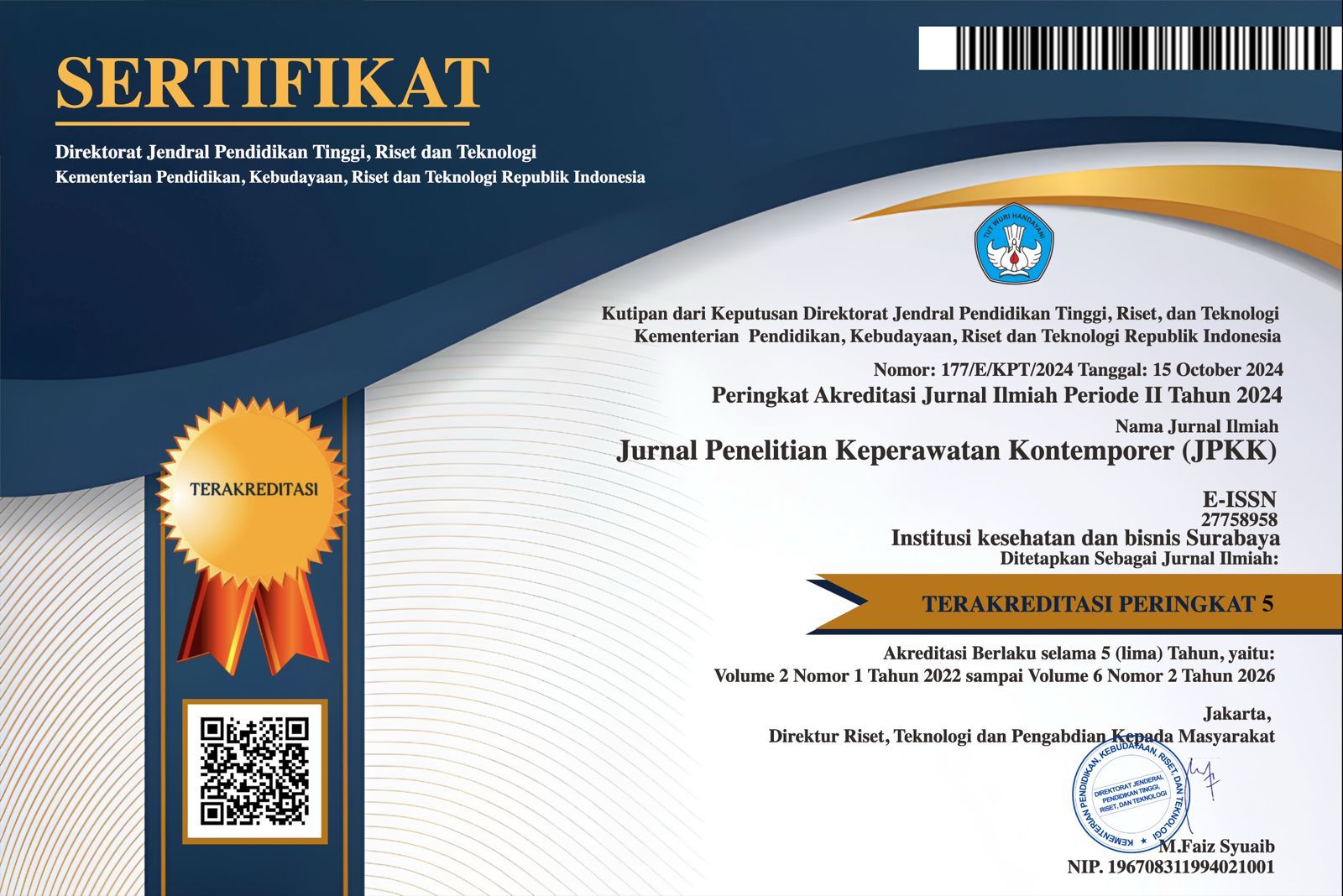PENGARUH PUASA INTERMITEN TERHADAP KESEHATAN HORMONAL DAN REPRODUKSI WANITA: TINJAUAN LITERATUR
DOI:
https://doi.org/10.59894/jpkk.v5i4.989Keywords:
puasa intermiten, hormon reproduksi, kesuburan, wanita, ritme sirkadianAbstract
Background: Intermittent fasting (IF) has gained popularity as a nutritional approach for weight management and metabolic improvement. However, its effects on women's hormonal and reproductive health remain controversial, as the female endocrine system is highly sensitive to energy intake fluctuations and circadian rhythm shifts. Objective: This review aims to evaluate recent literature on the impact of IF on reproductive hormone balance, menstrual cycle, fertility, and long-term risks in women. Method: The method employed was a systematic review of 10 scientific articles retrieved from PubMed, ScienceDirect, and Nature databases published between 2018 and 2025. Results: Findings indicate that IF may offer hormonal benefits, especially for women with polycystic ovary syndrome (PCOS), through improved insulin sensitivity, menstrual regularity, and ovulation. However, IF also poses potential risks such as amenorrhea, anovulation, and delayed sexual maturation, particularly when applied without considering circadian alignment and nutritional status. Furthermore, fasting schedules that conflict with women’s biological rhythms may disrupt endocrine function and reproductive performance. Conclusion: In conclusion, while IF presents promising benefits, its implementation in women must be individualized and approached with caution, considering age, hormonal profile, and lifestyle. These findings are expected to guide health practice in providing evidence-based nutritional education and reproductive health interventions for women of reproductive age.
References
Kane, A. E., Sinclair, D. A., Mitchell, J. R., & Mitchell, S. J. (2018). Sex differences in the response to dietary restriction in rodents. Current Opinion in Physiology, 6, 28–34. https://doi.org/10.1016/j.cophys.2018.03.008
Luo, Q., Li, W., Li, M., Zhang, X., & Zhang, H. (2016). Leptin/leptinR-kisspeptin/kiss1r-GnRH pathway reacting to regulate puberty onset during negative energy balance. Life Sciences, 153, 207–212. https://doi.org/https://doi.org/10.1016/j.lfs.2016.03.048
Schneider, L. F., Monaco, S. E., & Warren, M. P. (2008). Elevated ghrelin level in women of normal weight with amenorrhea is related to disordered eating. Fertility and Sterility, 90(1), 121–128. https://doi.org/https://doi.org/10.1016/j.fertnstert.2007.06.002
Swamy, S., Xie, X., Kukino, A., Calcagno, H. E., & Lasarev, M. R. (2018). Circadian disruption of food availability significantly reduces reproductive success in mice. Hormones and Behavior, 105, 177–184. https://doi.org/https://doi.org/10.1016/j.yhbeh.2018.07.006
Tripathi, V., Bhardwaj, S. K., & Kumar, V. (2025). Ecology of timekeeping: feeding times effect clock-controlled behavior, metabolism and reproduction in diurnal vertebrates. Npj Biological Timing and Sleep, 2(1), 1–12. https://doi.org/10.1038/s44323-025-00022-8
Varady, K. A., Cienfuegos, S., Ezpeleta, M., & Gabel, K. (2022). Clinical application of intermittent fasting for weight loss: progress and future directions. Nature Reviews Endocrinology, 18(5), 309–321. https://doi.org/10.1038/s41574-022-00638-x
Velissariou, M., Athanasiadou, C. R., Diamanti, A., Lykeridou, A., & Sarantaki, A. (2025). The impact of intermittent fasting on fertility: A focus on polycystic ovary syndrome and reproductive outcomes in Women-A systematic review. Metabolism Open, 25(December 2024), 100341. https://doi.org/10.1016/j.metop.2024.100341
Zhao, S., Hu, S., Sun, K., Luo, L., & Zeng, L. (2023). Pu-erh tea intake enhances the anti-obesity effect of intermittent fasting via modulating follicle-stimulating hormone and gut dysbacteriosis in female high-fat-diet mice. Journal of Functional Foods, 104(February), 105495. https://doi.org/10.1016/j.jff.2023.105495
Downloads
Published
How to Cite
Issue
Section
License
Copyright (c) 2025 Nanda Fadhilah Witris Salamy, Nur Sophia Matin

This work is licensed under a Creative Commons Attribution 4.0 International License.
All articles published by Jurnal Penelitian Keperawatan Kontemporer (JPKK), the authors hold the copyright under license Creative Commons Attribution License.











